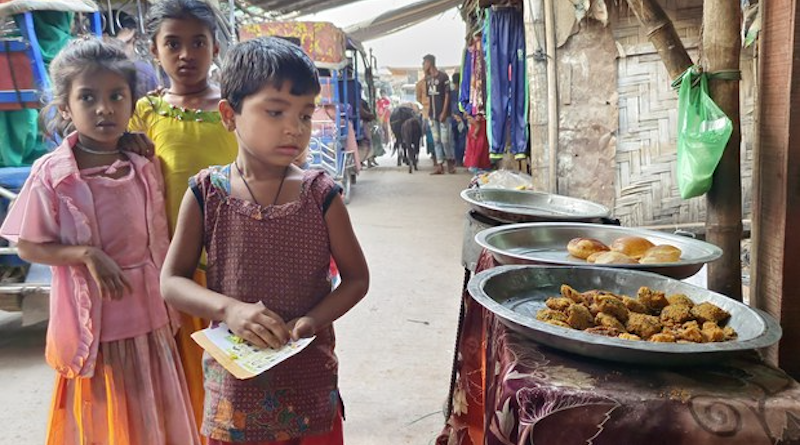Bangladesh: UN To Cut Food Aid For Rohingya Over Lack Of Funds
By BenarNews
By Reyad Hossain and Abdur Rahman
The United Nations World Food Program announced on Friday that it will cut food aid to Bangladesh’s Rohingya starting in March because of funding shortfalls and despite warnings from its own experts that malnutrition is pervasive in the refugee camps.
Reacting to the cut, to U.S. $10 a month per person from $12, some Rohingya in Bangladesh’s refugee camps told BenarNews that they were already living hand-to-mouth and could foresee leading an even more miserable existence come March.
The WFP said that this was the first time in six years that it was being “forced to cut back” on assistance for the Rohingya, even as it warned deeper cuts may be necessary by April, if its appeal for another $125 million in funding was not met.
“This is a devastating blow to the Rohingya and an equally devastating blow to the humanitarian community,” Domenico Scalpelli, WFP country director in Bangladesh, said in a statement.
“With other critical services already dwindling, the repercussions of the ration cut – even if just $2 – will be dire.”
The WFP statement said that 45% of Rohingya families are not eating a sufficient diet and malnutrition has been widespread in the camps. About 40% of children have stunted growth and 40% of pregnant and breastfeeding women are anemic.
“With each ration cut, malnutrition will certainly rise,” Scalpelli said.
The WFP announcement came a day after U.N. experts urgently appealed for donations for the persecuted Myanmar minority, about 740,000 of whom fled their home country for neighboring Bangladesh amid a brutal military crackdown in 2017.
“While many states have called for justice and accountability for the Rohingya, those in the camps need more than words and statements of solidarity,” U.N. experts Thomas Andrew and Michael Fakhri said in a statement.
“Rohingya refugees need immediate action from the international community to ensure that these cuts – and their generation-spanning consequences – are avoided. The stakes could not be higher,” they said.
The Rohingya have limited employment opportunities in the camps and rely almost entirely on humanitarian assistance to meet their food and other essential needs.
No money for food could make refugees more desperate, which could in turn fuel more violence and unrest in the camps, they said.
“This could also lead to a myriad of human rights concerns, such as a heightened risk of human trafficking, particularly of children and girls, and more refugees embarking on perilous boat journeys,” they said.
The WFP has since 2017 been providing food and other assistance to refugees who have settled in the camps in and around Cox’s Bazar in southeastern Bangladesh.
In all, nearly 1 million Rohingya live in the camps and receive food assistance through vouchers which allow families to choose from more than 40 dry and fresh food items at WFP outlets throughout the camps.
‘Insufficient’
Mohammed Jubair, acting chairman of the Arakan Rohingya Society for Peace and Humanity, said the food aid cut could worsen lives in the camp.
“The existing allocation of $12 per month is insufficient – if the rations are reduced further, the Rohingya will be short of food. As a result, they will engage in various vices to remove the shortage,” he told BenarNews.
He wants Rohingya to be able to work to be able to pay for necessities.
Another Rohingya resident of the camps, Nur Bashar, said the funding cut “will have a very bad effect.”
“As there was no opportunity to work outside, one led a miserable life. Now that life will be more difficult,” he told BenarNews.
Mohammad Mizanur Rahman, Bangladesh’s Refugee Relief and Repatriation Commissioner, expressed similar concerns.
“Because of the lack of food, the Rohingya will try to go outside the camps for work. As a result, there will be a chance to create an unwanted situation,” he told BenarNews while calling on international donors to step up to meet the WFP request.
Meanwhile, Onno van Manen, country director of Save the Children in Bangladesh, called the lack of funding unconscionable.
“While the cost-of-living skyrockets in Bangladesh and across the world, Rohingya children and their families are at breaking point and need more support, not less,” he said in a statement.
“We are hearing reports of increasing hunger and malnutrition, as well as child marriage and child labor, at a time when parents have almost no opportunities to work, and families are increasingly risking their lives at sea to seek a life beyond their refugee camp.”
“That the World Food Program is being pushed to taking away nearly 20% of children’s already very basic food intake, is unconscionable” he said.
Asif Munir, a former International Organization for Migration official, said assistance is needed as there has been little movement in efforts to allow Rohingya to return to their homes in Myanmar.
“Now the food package should be fixed keeping in mind the nutrition of children,” he told BenarNews.

